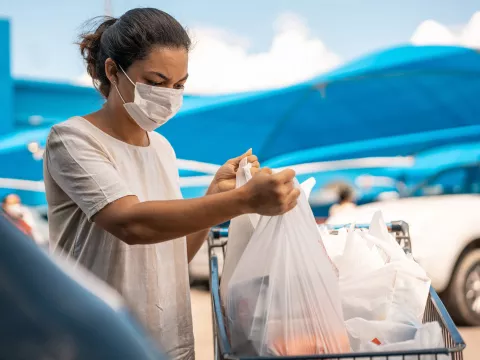- AdventHealth Centra Care

Gather Supplies Ahead of Time
Before a hurricane, grocery stores will have a major rush of people gathering supplies. Depending on what you need and the store’s inventory, it may be difficult to find certain items. If a storm is approaching, you could call your grocery store before you shop, shop in the mornings or consider having items shipped through Amazon for these supplies:
- Baby items (diapers, bottles, formula)
- Batteries
- Battery-powered radio
- Candles (and matches or lighters)
- Canned foods and shelf-stable snacks
- Disposable plates, cups, napkins and utensils
- Distilled or sparkling water (enough for drinking and bathing)
- First aid supplies
- Flashlights
- Ice
- Non-electric can opener
Make a Family Plan
It’s a good idea for every family to have a disaster plan, even if that disaster never strikes. First, think ahead about evacuation. Do you know where you'll go if you're ordered to leave? Plan ahead to determine a safe location.
As you make your family plan, look to your local government agencies for guidance on shelter and evacuation planning for hurricanes, especially during global health crises like a pandemic.
Keep a Contact List
Most of us rely on our phones to remember (or look up) important phone numbers, but in the event of a power or internet outage, it’s smart to keep a paper list of these contacts:
- County law enforcement
- County public safety and fire rescue
- Friends and family members
- Local American Red Cross
- Local emergency management office
- Local hospitals
- Local utilities
- Local television and radio stations
- State, county and city or town government
- Your property insurance
Be Health Smart
No matter what level of care you require, it’s vital to make arrangements ahead of time. Here are a few tips:
- Expectant mothers who are two weeks away or less from their delivery date or considered high-risk can make arrangements with their physician or hospital
- For special needs, call your physician in advance of a storm if you depend on an electronic medical device, oxygen or other equipment, or need in-home health care
- Prepare your prescriptions, and have a two-week supply on hand
- Refresh your first aid kit, and restock it with new supplies, such as aspirin or other pain relievers, antacids, bandages and gauze, a thermometer, scissors and antiseptics
Prepare Your Home
First things first: We strongly recommend that you heed any evacuation orders. Whether you are riding out the storm at home or securing it before you evacuate, here are some preparations to make in advance:
- Bring in lawn furniture, plants, trash cans, bicycles and other items that could become airborne in high winds
- Clean and fill bathtubs with water
- Identify a safe room in your home (an interior, windowless room on the lower floor is best)
- If you don't have permanent storm shutters, board up windows with 5/8 marine plywood (tape is not strong enough to prevent shattering)
- Store copies of important documents (such as passports, birth certificates, and insurance policies) in a waterproof container
Don't Forget About Pets
In the rush to prepare, furry family members can sometimes get overlooked. Aside from keeping pets inside as much as possible during and after a storm, here some ways to prepare for their care:
- Gather immunization records in case you need to evacuate
- Make sure you have a two-week supply of food, supplies and medications
- Take a current photo of each pet (in case they become lost)
As always, the safety and comfort of our patients, visitors, and staff is our top priority. We have a comprehensive disaster plan in place to care for our communities in the event of a hurricane.





